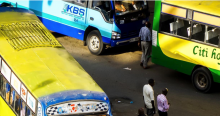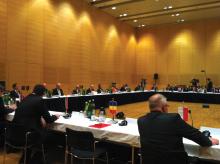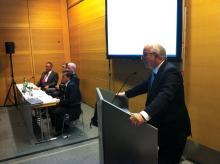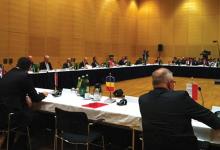Speaking at the IRF-SATC webinar on “The impact of COVID-19 on freight and logistics” hosted on 12th August, Abishek Sharma, senior director of transport at TradeMark East Africa, said countries in Africa have started to compete with each other. These nations are intent on showing that their response to Covid is better than their neighbours'. It involves, among other things, stricter lockdown strategies and better testing regimes.
Regionally, for example, it can be seen in the manner Botswana has responded to the virus. Although it is one of the sub-Saharan countries to respond fastest to decontamination requirements, its testing control of truck drivers has also been described as inflexible, causing a ripple effect of congestion-related problems across the region.
Closing down of borders has been often the corollary of enforcement of strict Covid response strategies. The cost-consequences or “true impact” of nationalistic responses to COVID-19,, he argued, “will be visible once we get the GDP figures for the next quarter”.
As the COVID-19 crisis keeps unfolding, it threatens to erode progress made in reducing time and costs on the trade corridors in the region. Increased time and expenses incurred due to COVID-19 are going to increase export costs from EAC economies, thereby significantly reducing their competitiveness in export markets.
An approximate US$23 million budget has been made available by the EU, Canada, the UK and the US (pending) and this is being handled by TradeMark East Africa whose COVID-19 response combines a range of short- to medium-term actions:
- Make ports and borders safe
- Guarantee food security and access to medicines
- Prevent job losses and build resilienc
Countries covered by the programme: Burundi, Eastern DRC, Djibouti, Ethiopia, Kenya, Malawi, Rwanda, Somaliland, South Sudan, Tanzania, Uganda and Zambia. The Partners are: customs, port and health authorities, regional private sector and cross border apex bodies, humanitarian organisations.
 Kazem Asayesh, senior advisor at the International Road Transport Union (IRU) also speaking at the event said “Covid nationalism is alarmingly detrimental to the re-emergence of trade diversification”. He added that although it was recognised that an adequate response to COVID-19 was important to protect communities and industries, it should not impede trade.
Kazem Asayesh, senior advisor at the International Road Transport Union (IRU) also speaking at the event said “Covid nationalism is alarmingly detrimental to the re-emergence of trade diversification”. He added that although it was recognised that an adequate response to COVID-19 was important to protect communities and industries, it should not impede trade.
This webinar was the second of a series of webinars organised by the International Road Federation and the Southern Africa Transport Conference (SATC). All the presentations as well as the webinars’ recordings can be freely accessed on IRF website: www.irfnet.ch. The next IRF-SATC webinar is scheduled in October. More information on IRF website.
IRF inaugurates the ‘IRF Executives Talks’ series
Join the International Road Federation for this series of 30-minute talks and get insights from CEOs and high-level executives of the world’s most innovative and influential companies and organisations from the industry. The series will talk about challenges that our sector faces, innovative programmes and ideas and how to inspire and lead them, overcoming adversity, bringing change and a lot more. Those wishing to take part can prepare in advance! There is some time reserved for the audience to put forward questions.
• Places available for each webinar are limited so check the calendar and register on www.irfnet.ch
Free online workshop on Road Safety Audits
Building on a well-established collaboration with the University of Qatar and the Qatar Transportation and Traffic Safety Centre (QTTSC), the International Road Federation will be supporting a workshop on Road Safety Audits to be hosted on 8th-10th November 2020.
According to the 2018 World Health Organisation (WHO) Global Status Report on Road Safety, there are 1.35 million road traffic deaths every year. Road Traffic Injuries are 8th leading cause of death worldwide. Road Safety Audits (RSAs) have proved to be an effective tool to assess and manage risk when applied - at a minimum - one stage prior to construction of the road and one stage following construction of the road.
Hosted over three days, this online technical workshop aims at building understanding of the importance and benefits of RSAs. Furthermore, it provides basic information on the scope and procedure of RSAs as well as the role and skills of the RSA team.
The agenda will cover :
- Introduction to the Management of Road Safety in Infrastructure
- Road Safety Audits & Inspections
- The Ten Step Plan for Safer Road Infrastructure
- Road Safety for Designers
- Road Safety in Tunnels
• The webinar is freely available. For more information and registrations: www.irfnet.ch














